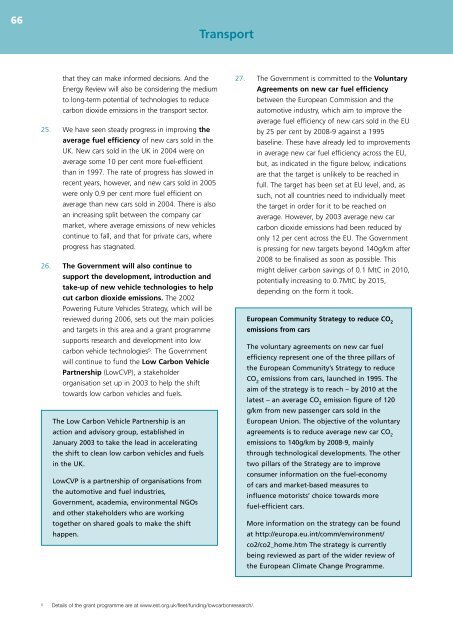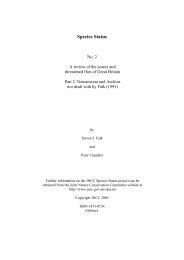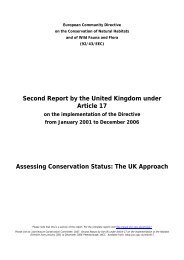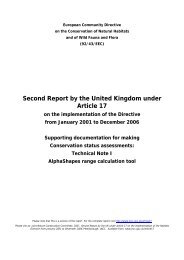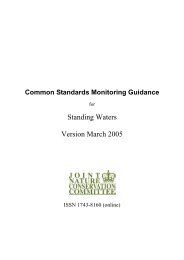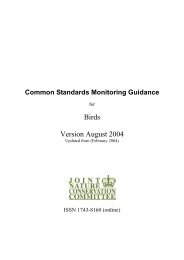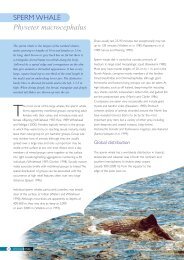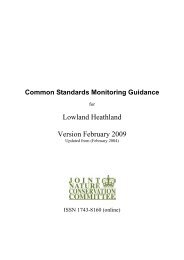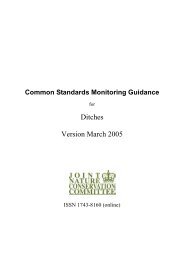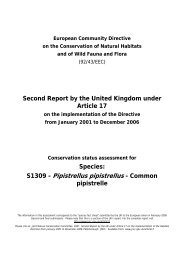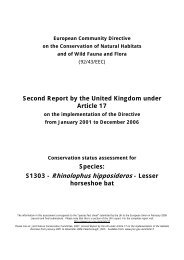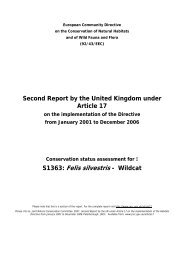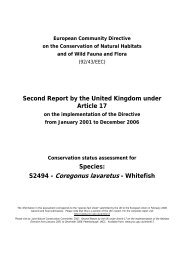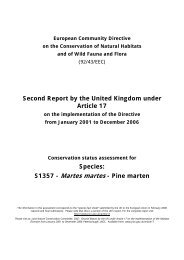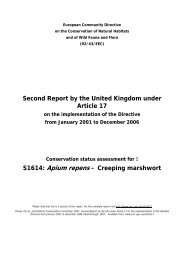UK Climate Change Programme 2006 - JNCC - Defra
UK Climate Change Programme 2006 - JNCC - Defra
UK Climate Change Programme 2006 - JNCC - Defra
Create successful ePaper yourself
Turn your PDF publications into a flip-book with our unique Google optimized e-Paper software.
66<br />
Transport<br />
that they can make informed decisions. And the<br />
Energy Review will also be considering the medium<br />
to long-term potential of technologies to reduce<br />
carbon dioxide emissions in the transport sector.<br />
25. We have seen steady progress in improving the<br />
average fuel efficiency of new cars sold in the<br />
<strong>UK</strong>. New cars sold in the <strong>UK</strong> in 2004 were on<br />
average some 10 per cent more fuel-efficient<br />
than in 1997. The rate of progress has slowed in<br />
recent years, however, and new cars sold in 2005<br />
were only 0.9 per cent more fuel efficient on<br />
average than new cars sold in 2004. There is also<br />
an increasing split between the company car<br />
market, where average emissions of new vehicles<br />
continue to fall, and that for private cars, where<br />
progress has stagnated.<br />
26. The Government will also continue to<br />
support the development, introduction and<br />
take-up of new vehicle technologies to help<br />
cut carbon dioxide emissions. The 2002<br />
Powering Future Vehicles Strategy, which will be<br />
reviewed during <strong>2006</strong>, sets out the main policies<br />
and targets in this area and a grant programme<br />
supports research and development into low<br />
carbon vehicle technologies 5 . The Government<br />
will continue to fund the Low Carbon Vehicle<br />
Partnership (LowCVP), a stakeholder<br />
organisation set up in 2003 to help the shift<br />
towards low carbon vehicles and fuels.<br />
The Low Carbon Vehicle Partnership is an<br />
action and advisory group, established in<br />
January 2003 to take the lead in accelerating<br />
the shift to clean low carbon vehicles and fuels<br />
in the <strong>UK</strong>.<br />
LowCVP is a partnership of organisations from<br />
the automotive and fuel industries,<br />
Government, academia, environmental NGOs<br />
and other stakeholders who are working<br />
together on shared goals to make the shift<br />
happen.<br />
27. The Government is committed to the Voluntary<br />
Agreements on new car fuel efficiency<br />
between the European Commission and the<br />
automotive industry, which aim to improve the<br />
average fuel efficiency of new cars sold in the EU<br />
by 25 per cent by 2008-9 against a 1995<br />
baseline. These have already led to improvements<br />
in average new car fuel efficiency across the EU,<br />
but, as indicated in the figure below, indications<br />
are that the target is unlikely to be reached in<br />
full. The target has been set at EU level, and, as<br />
such, not all countries need to individually meet<br />
the target in order for it to be reached on<br />
average. However, by 2003 average new car<br />
carbon dioxide emissions had been reduced by<br />
only 12 per cent across the EU. The Government<br />
is pressing for new targets beyond 140g/km after<br />
2008 to be finalised as soon as possible. This<br />
might deliver carbon savings of 0.1 MtC in 2010,<br />
potentially increasing to 0.7MtC by 2015,<br />
depending on the form it took.<br />
European Community Strategy to reduce CO 2<br />
emissions from cars<br />
The voluntary agreements on new car fuel<br />
efficiency represent one of the three pillars of<br />
the European Community’s Strategy to reduce<br />
CO 2<br />
emissions from cars, launched in 1995. The<br />
aim of the strategy is to reach – by 2010 at the<br />
latest – an average CO 2<br />
emission figure of 120<br />
g/km from new passenger cars sold in the<br />
European Union. The objective of the voluntary<br />
agreements is to reduce average new car CO 2<br />
emissions to 140g/km by 2008-9, mainly<br />
through technological developments. The other<br />
two pillars of the Strategy are to improve<br />
consumer information on the fuel-economy<br />
of cars and market-based measures to<br />
influence motorists’ choice towards more<br />
fuel-efficient cars.<br />
More information on the strategy can be found<br />
at http://europa.eu.int/comm/environment/<br />
co2/co2_home.htm The strategy is currently<br />
being reviewed as part of the wider review of<br />
the European <strong>Climate</strong> <strong>Change</strong> <strong>Programme</strong>.<br />
5 Details of the grant programme are at www.est.org.uk/fleet/funding/lowcarbonresearch/.


